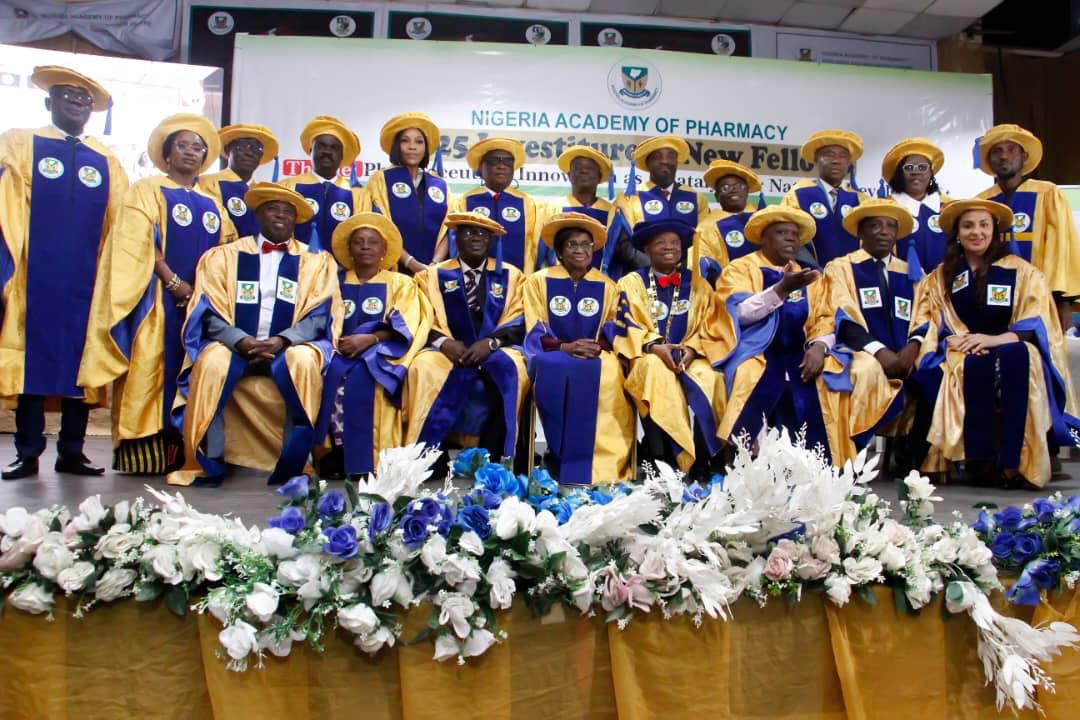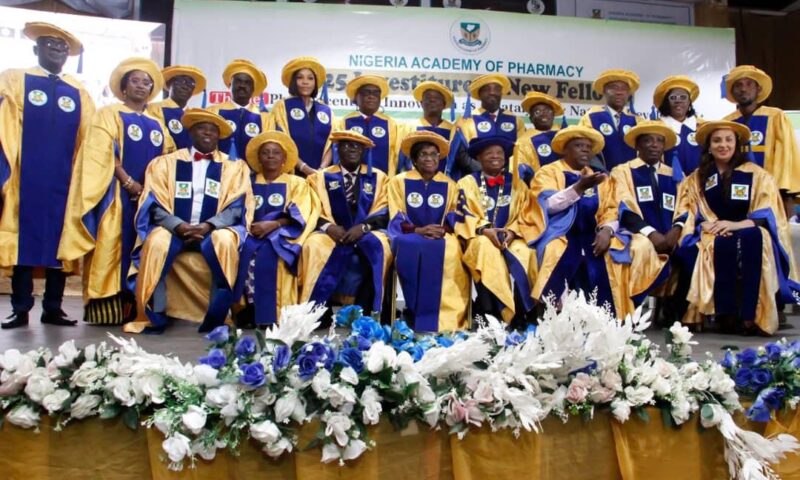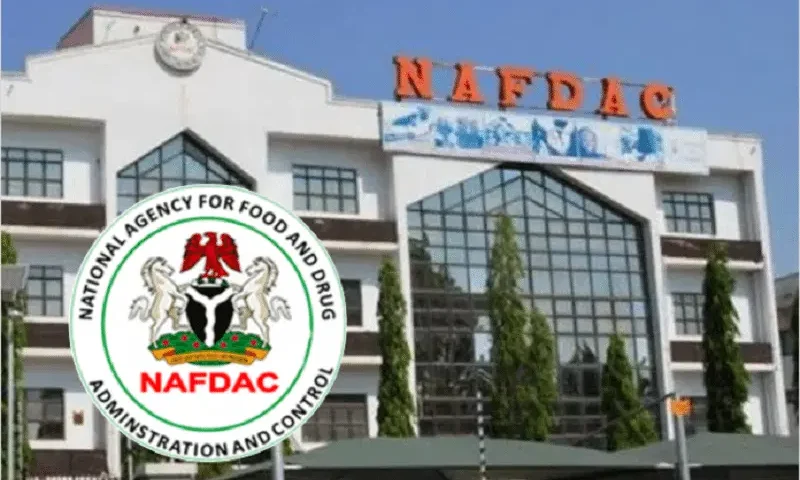NAPHARM Reiterates Its Commitment To Advancing Nigeria’s Healthcare Sector

By Winifred Bosa
The Nigeria Academy of Pharmacy (NAPHARM) has restated its commitment to strengthening the nation’s healthcare system and promoting national development through pharmaceutical innovation.
This reaffirmation came during the Academy’s 2025 Annual General Meeting (AGM), Valedictory Session in honour of its founding president, Pharm. Chief Oludolapo Ibukun Akinkugbe, and the Investiture Ceremony for newly elected Fellows.
The two-day event, held from Wednesday, October 15 to Thursday, October 16, 2025, at the Old Great Hall, College of Medicine, University of Lagos, Idi-Araba, drew leading voices from the healthcare, academic, and professional sectors.
This year’s gathering was anchored on the timely and transformative theme:
“Pharmaceutical Innovation as a Catalyst for National Development.”
The series of events brought together distinguished leaders, professionals, policymakers, and scholars from across Nigeria and the global pharmaceutical community to reflect on how innovation in pharmacy and healthcare can drive economic diversification, job creation, and national progress.
A Celebration of Legacy and Leadership
The 2025 edition was particularly significant as it featured a Valedictory Session in honour of the late Pharm. Chief Oludolapo Ibukun Akinkugbe, CFR, FNAPharm, was the revered founding President of the Academy and a towering figure whose vision, mentorship, and integrity shaped generations of pharmacists and national leaders.
Fellows and dignitaries offered passionate tributes to Chief Akinkugbe’s legacy of excellence, enduring influence on healthcare systems, and lifelong commitment to professionalism, ethics, and nation-building.
Speaking at the Valedictory Session, Prof. Lere Baale, President and Chairman of the Governing Council of NAPHARM, described Chief Akinkugbe as “a pharmacist, leader, and statesman whose life exemplified grace, discipline, and visionary service to humanity.”
Keynote Address: Innovation as an Engine of Growth
The highlight of the Investiture Ceremony was the Keynote Address delivered by Mr Wale Oyedeji, Group Managing Director of First HoldCo Plc, who spoke on “Pharmaceutical Innovation as a Catalyst for National Development.”
In his address, Mr Oyedeji underscored the critical role of research, local manufacturing, digital health, and investment in building a resilient pharmaceutical value chain that supports Nigeria’s industrial and health security goals.
He emphasised that “pharmaceutical innovation is not only about developing new drugs but also about creating an ecosystem that supports knowledge, entrepreneurship, and collaboration across public and private sectors.”
He called on government, academia, investors, and practitioners to align strategies to harness Nigeria’s demographic advantage and intellectual capital for sustainable development.
New Fellows Inducted into the Academy
A significant highlight of the event was the induction of new Fellows into the Nigeria Academy of Pharmacy. These distinguished professionals were recognised for their outstanding contributions to pharmacy education, research, practice, policy, and entrepreneurship.
The 14 new Distinguished Fellows include:
Pharm. Dr Samuel Oluwaoromipin Adekola, Pharm. Yedunni Abimbola Adenuga; Pharm. Dr Adenike Olubisi Adenuga; Pharm. Dr Victor Gbenga Afolabi, Pharm. Prof. Ezekiel Olugbenga Akinkunmi; Pharm. Dr Umoru Barde Ali, Pharm. Prof. Olufunsho Awodele, Pharm. Jaiyeola Adetunji Doherty; Pharm. Dr Monica Hemben Eimunjeze, Pharm. Ayuba Tanko Ibrahim; Pharm. Dr Thomas Omotayo Ilupeju, Pharm. Dr Wilson Ishima, Pharm. Steve Azubuike Okoronko, and Pharm. (Mrs.) Olayinka Folashade Oredola.
4 Honorary Fellows include Pharm Elder Ebenezer Adeleke, Pharm Alfred Oladeji Osinoiki, Chief Varkey Verghese MFR, and Alhaji Sayyid Atana.
The 3 Lifetime Achievements Awardees were Pharm Prof Gabriel Osuide, Pharm Asiwaju Theophilous Adebowale Omotosho, and Dr Fidelis Ayebae.
Prof. Lere Baale, while congratulating the new Fellows and Lifetime Achievement Awardees, noted that “the Academy remains a think tank for advancing pharmaceutical excellence, knowledge translation, and health system innovation in Nigeria and across Africa.” He urged the new Fellows to carry forward the ideals of integrity, scholarship, and service that define the Academy’s ethos.
A Gathering of Excellence and Unity
The event drew a constellation of distinguished personalities from academia, industry, and government, including:
•Prince Julius Adelusi-Adeluyi, OFR, mni, FPSN, Founding President, Nigeria Academy of Pharmacy;
•Prof. Mojisola Adeyeye, Director-General, NAFDAC;
•Pharm. Sir Ike Onyechi, FPSN, FPCPharm, FNAPharm;
•Pharm. (Chief) Olubunmi Olaopa, FPSN;
•Pharm. Prof. Fola Tayo, MFR, FPSN;
•Pharm. Prof. Cecilia Igwilo, OFR, FPSN;
•and other eminent Fellows and guests.
The event featured moments of reflection, inspiring speeches, awards, and musical interludes that highlighted the intellectual and cultural vibrancy of the profession.
Advancing the Future of Pharmacy and National Development
The 2025 AGM and Investiture reaffirmed the Academy’s mission as a beacon of thought leadership and advocacy for integrating pharmaceutical science into national development planning.
In his closing remarks, Prof. Baale noted:
“Pharmacy holds the power to shape the future of Nigeria’s healthcare, innovation, and industrial growth. When we invest in pharmaceutical innovation, we are not just advancing science — we are securing our nation’s health, economy, and dignity.”
The gathering concluded with a renewed commitment to collaboration, mentorship, and policy advocacy to strengthen Nigeria’s health systems and inspire the next generation of innovators.





 …Says Agency Already Has Strengthened Regulatory System for Vaccines, Biologics, and Medical Devices Through Restructuring and Global Benchmarking.
…Says Agency Already Has Strengthened Regulatory System for Vaccines, Biologics, and Medical Devices Through Restructuring and Global Benchmarking.